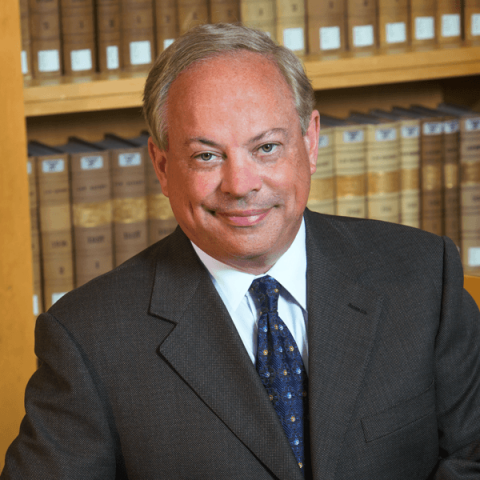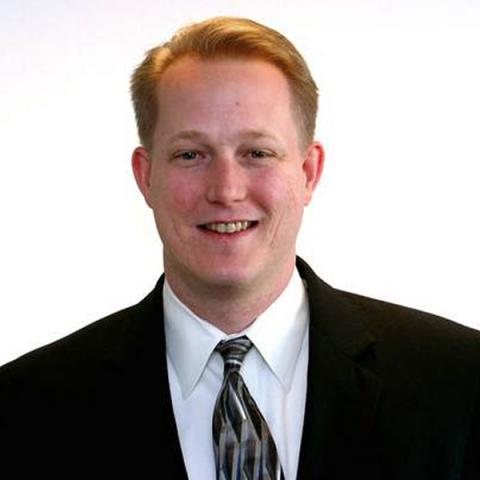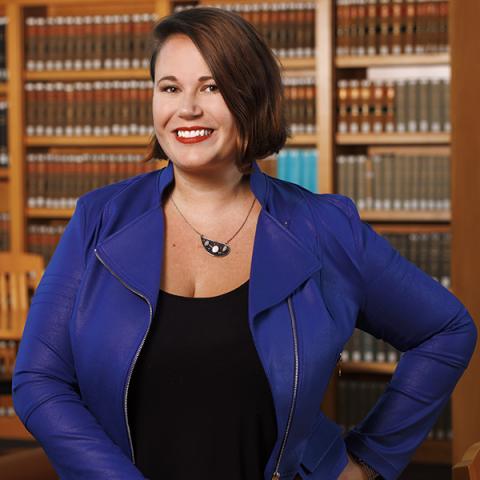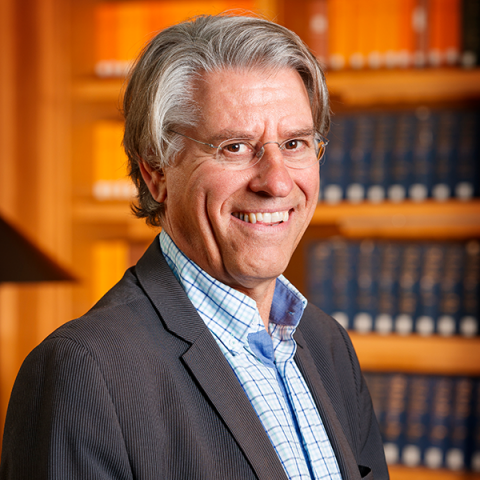
Jack M. Beard Associate Professor of Law and Director, Space, Cyber, and National Security Law Program
Professor Jack Beard joined the law faculty in 2011. Before coming to Nebraska, he was a member of the faculty at the UCLA School of Law. He previously served for fourteen years as the Associate Deputy General Counsel (International Affairs) in the Department of Defense where he was responsible for a variety of legal matters related to arms control agreements, defense cooperation and basing agreements in the Middle East region, and programs assisting states of the former Soviet Union in dismantlement of weapons of mass destruction (WMDs) and other nonproliferation activities. These latter activities included the removal of nuclear weapons from Belarus, Kazakhstan and Ukraine and the elimination of other WMDs and related infrastructure in those countries. He served as the senior lawyer on numerous U.S. delegations negotiating international agreements on a wide range of U.S. military operations and activities. He also served on active and reserve duty as an officer in the U.S. Army Judge Advocate General’s Corps, where his assignments included Chief of the International Law Section, International and Operational Law Division, Office of The Judge Advocate General of the Army. He is a Lieutenant Colonel in U.S. Army JAG Corps (Retired).
Professor Beard is a Director of the Space, Cyber, and National Security Law Program, teaching courses in International Cyber Security and National Security Space Law. He also teaches courses in National Security Law, Arms Control, and Human Rights & International Criminal Law. His primary research interests focus on public international law and national security law, with a particular emphasis upon space law and military uses of space, cyber capabilities, arms control, the law of armed conflict, and the international legal implications of modern military technologies. He was recognized as a Cyber Security & Data Privacy Trailblazer by the National Law Journal.
Professor Beard is the Editor-in-Chief of the Woomera Manual on the International Law of Military Space Activities and Operations (Oxford University Publishing, forthcoming 2024).
Professor Beard is the Chairman of the Committee on the Use of Force of the American Branch of the International Law Association (ABILA), a member of the ABILA Board of Directors, and is one of the U.S. representatives on the London-based International Law Association’s Committee on the Use of Force. He is also a member of the International Institute of Space Law.
Watch to see how Professor Beard is guiding the laws of military space operations.
Dennis J Burnett Adjunct Professor of Law
Professor Burnett is an attorney and business advisor with experience in commercial transactions and regulatory matters representing both U.S. and foreign clients in the aerospace industry. He has extensive international experience; particularly in Europe, Russia and China. Professor Burnett has recognized subject matter expertise in all aspects of commercial space activities, export licensing and compliance and foreign ownership control or influence (“FOCI”) mitigation for U.S. companies holding U.S. facility security clearances. His experience includes government service, corporate counsel and private practice.
Some highlights from Professor Burnett’s career include: representing the Russian Space Agency in the negotiation of the first multi-million dollar Space Station contract with NASA; negotiation of several satellite purchase contracts; drafting the model launch services agreement for an international launch service provider; preparing and obtaining satellite operating licenses for both communications satellites and remote sensing satellites and obtaining national security waivers from the President to allow launches of U.S. satellites or U.S. satellite components from China.
Professor Burnett actively supports development of space law and policy and export law and policy. He is a member of the D.C. Bar, American Bar Association, American Association of Aeronautics and Astronautics and is a member and Treasurer of the International Institute of Space Law. He also served three terms on the Defense Trade Advisory Group for the U.S. Department of State. Professor Burnett is the Vice Chair of the Advisory Board for the LL.M. Space, Cyber and Telecom Program of the University of Nebraska College of Law.

Fred Campbell Adjunct Law Professor
Fred Campbell is Executive Director of the Center for Boundless Innovation in Technology and a member of the Space, Cyber and Telecommunications Law Program Advisory Board. Mr. Campbell was formerly a Fellow and Director of the Communications Liberty and Innovation Project at the Competitive Enterprise Institute, President and CEO of the Wireless Communications Association International, Chief of the Wireless Telecommunications Bureau at the Federal Communications Commission (FCC), and Wireless Legal Advisor to FCC Chairman Kevin Martin. He has also served as a judicial clerk for Nebraska Supreme Court Justice William M. Connolly and an Arabic linguist in the 101st Airborne Division of the United States Army. Mr. Campbell earned a Diploma in Modern Standard Arabic at the Defense Language Institute, a B.S. from Excelsior College, and a J.D., with high distinction, from the University of Nebraska College of Law.

Elsbeth Magilton Director of Externships, ADJUNCT LAW PROFESSOR, and Executive Director of Space, Cyber, and National Security Law
Elsbeth Magilton is an attorney and professor serving as the Director of Externships and the Executive Director of the Space, Cyber, and National Security Law programs at the University of Nebraska College of Law. Presently, Elsbeth is also a 2023-2024 Scowcroft National Security Fellow at the Eisenhower Center for Space and Defense in the U.S. Air Force Academy. She has served as a faculty mentor to the U.S. Strategic Command Fellows program at the University of Nebraska at Omaha since 2022, and also is faculty researcher at the Nebraska Deterrence Lab (NDL) located in the Peter Kiewit Institute. NDL conducts research on multi-actor deterrence, multi-actor quantitative risk, and decision-making for private, public, and defense sectors.
Elsbeth was a 2023 TEDx speaker, has keynoted multiple conferences, spoke at SXSW in 2021, and speaks internationally on space topics and education. In September 2018 Elsbeth’s team received a major NASA Space Law pilot-program grant to create a nationwide network of students, faculty, and practitioners interested in space law and policy. She is member of the “SPACE²” University of Nebraska Grand Challenges Team, whose vision is for the University of Nebraska-Lincoln to grow the first acre of corn on Mars’ soil.
In addition to her interest in space law and technology, Elsbeth specializes in experiential legal education and practical workforce development. In 2022 Elsbeth was named a “NExt Pioneer” fellow with the Nebraska Tech Collaborative – a workforce initiative examining tech talent retention in the Midwest. In September 2022 she was appointed to her present position as the Director of Externships at Nebraska Law. As the program’s inaugural Director she developed a new experiential learning curriculum for law students in field placements outside the college, and teaches the general externship course, the nonprofit board service course, and ‘Public Speaking for Attorneys’ classes.
Magilton is part of the U.S. State Department Speaker’s Program under the Bureau of Educational and Cultural Affairs. Under that program she most recently visited the Digital Learning Hub and Women In Digital Empowerment groups in Luxembourg, discussing experiential education and workforce development. She also facilitated a roundtable discussion for the UzSpace agency and the U.S. Embassy in Tashkent on Uzbekistan’s commercial and governmental space interests, and gave series of lectures for the New Zealand and Australian Space Council on behalf of the U.S. Consulate in Auckland, New Zealand. Elsbeth is a member of the American Society of International Law and served as the Co-Chair (2020-2021) for the Space Law Interest Group. She is also a member of the Legal Expert Pool for the European Centre of Excellence for Countering Hybrid Threats.
Elsbeth previously served (2021-2023) as the board president for Girls Code Lincoln, a nonprofit organization striving to ignite passion for technology and leadership in 4th-9th grade students. She also is a member of the Advisory Board for the Branched Oak Observatory, an outdoor and indoor (open-roof) sky park supported by science education professionals and astronomy enthusiasts. Elsbeth is also a Lincoln Public Schools volunteer and a Girl Scout Troop Co-Leader. She would almost always rather be outside making art or building robots.
Elsbeth received her B.A., cum laude, from Doane University in 2008 in graphic design. After starting her career in web development, Elsbeth shifted into technology policy during law school. She earned her J.D. from the University of Nebraska College of Law and received a concentration in Cyberlaw. During law school Elsbeth also attended the William and Mary College of Law, working with the Center for Legal and Court Technology.
Personally, Elsbeth enjoys being a parent, reading, and gaming. She is married to a concert and event chef who has fed musicians and athletes around the country.

Matthew Schaefer Clayton Yeutter Chair and Professor of Law
Matthew Schaefer is the Clayton Yeutter Chair at the University of Nebraska College of Law and Yeutter Institute for International Trade and Finance. Upon being name Yeutter Chair in January 2022, Professor Schaefer stated: “I am very honored to be named the Yeutter Chair and continue to work with my remarkable colleagues to continue to grow the Yeutter Institute’s already significant reach in programming for students and stakeholders, and in research. Clayton Yeutter’s outstanding government service was integral to the formation of the most important international trade agreements and institutions. Indeed, Ambassador Yeutter’s efforts were highlighted in the opening sentence of my first international trade law course in law school taught by the esteemed Professor John H. Jackson. I have admired Ambassador Yeutter ever since as a student, trade consultant, government official and faculty member.”
Professor Schaefer has two articles being published in the Fall 2023/Spring 2024 related to international trade agreements: Self-Executing International Agreements and Private Rights of Action: Revisiting the 4th Restatement of Foreign Relations Law in the Context of International Trade and Investment Agreements, forthcoming in Univ. of Pennsylvania J. Intl. L. (2023/24) and Gene-Edited Crops and Food & the Bold Path Forward in U.S. Trade Agreement, forthcoming North Carolina J. Intl. L. (2023/24). A version of the latter article was also shared with the US Dept. of Agriculture as part of a grant research sponsored by the USDA.
From 2016-2021, he served as the Veronica A. Haggart and Charles R. Work Professor of International Trade Law. From 2006-2021 he served as the Founding Director, and subsequently Founding Co-Director of the Space, Cyber and Telecommunications Law Program. He has over two decades of law teaching experience and has taught courses in international trade law, international business transactions, international law, foreign relations law and policy, introduction to the American legal system, space law, and cyber law. In 2012, he led efforts to have the Law College adopt a required first-year course in international law for all J.D. students, and currently teaches a section of the course after co-teaching a combined course to all 1Ls with Professor Lepard for the seven years. Combined with his required upper-level course in international law for LL.M. students, most University of Nebraska students obtaining a J.D. or LL.M. degree are taught the basics of international law, and the intersection of international law with the US legal system, by Professor Schaefer.
During the 1999 calendar year, Professor Schaefer served as a director in the International Economic Affairs Office of the National Security Council (NSC) at the White House. He was the principal staff member responsible for the formulation, coordination, and implementation of U.S. foreign policy as it relates to international economic issues. In his role as a director, he prepared senior NSC officials for meetings with the President of the United States and foreign dignitaries and attended numerous NSC senior staff meetings, briefed the President of the United States in advance of EU-US Summits, and assisted in the development of international trade policy recommendations, including exempting food and medicine from US sanctions regimes, and seeking resolution of major trade disputes with the European Union.
Professor Schaefer joined Professors Folsom, Van Alstine, and Ramsey as a co-author on the 13th ed. of International Business Transactions: A Problem-Oriented Coursebook (2019, West Publishing), one of the best-selling coursebooks in the area. He is integrally involved in the Clayton Yeutter Institute of International Trade and Finance and conducted research with colleagues in the Agricultural Economics Dept. on high-technology agricultural products and international trade rules. During the Fall 2019 semester, Professor Schaefer gave a primer on international trade along with a colleague in the Business College at the Yeutter Trade Conference, “What’s on the Horizon for International Trade?” that had over 200 registrants. He also organized another international trade law conference in the Fall of 2019 that featured his coursebook co-authors as presenters and his Yeutter Institute colleagues as inter-disciplinary commentators as well as a keynote by former U.S. Sen. David Karnes. Professor Schaefer has also presented on international trade issues to both the Kutak Rock Agribusiness Seminar and a Law College/College of Business CLE Power Lunch together with Yeutter Institute Director Jill O’Donnell. Professor Schaefer also has consulted with lawyers and industry on strategies in response to recent tariffs imposed on steel, aluminum, and products from China, as well as NAFTA/USMCA rules of origin.
Professor Schaefer also was the lead person at the Law College in administering an international trade policy, economics, and law-related program in during 2012 and 2013 under a Clayton Yeutter International Trade grant through the US Department of Commerce. The programming included several distinguished international trade law lectures and seminars by visiting distinguished lecturers, including former director of the WTO legal division William Davey, Chair of Sidley and Austin’s DC international trade practice group Andy Shoyer, and Vice-President of Rock Creek Global Advisors Michael Smart. In the Spring of 2014, Professor Schaefer, with the research assistance of 2L Yeutter Scholar Samantha Ritter, drafted a US Supreme Court amicus brief, arguing that the Court should change the “apply anew” standard of review utilized by the Court of Appeals for the Federal Circuit to review trade remedy decisions of the Court of International Trade. The brief was signed by professors of international trade law at NYU, George Washington University, American University, Columbia University and the University of Illinois.
In February 2006, Professor Schaefer was named inaugural Director of the space law initiative and subsequently became the founding director of the USA's first degree-bearing Space, Cyber and Telecommunications Law Program. He continued as director of the program for over a decade until becoming co-director in 2016-17 along with his colleague Gus Hurwtiz and Professor Schaefer currently serves as Founding co-director, along with fellow co-directors Hurwitz and Beard. He was integrally involved in gaining University and external approval for the LLM degree (in 2006-07), developing the curriculum, hiring permanent faculty and adjunct faculty for the program, creating the Advisory Board and Alumni Council for the program, gaining University and external approval for the online version of the LLM degree (in 2011), and starting training sessions in the field for the STRATCOM Leadership Fellows. He is the principal organizer of the program’s annual conferences in Washington, D.C (12 thus far) that now exceed 200 registrants each year. He also organized the first eight annual Lincoln, NE conferences and has also organized regional conferences on space and cyber law in Omaha (in conjunction with US Strategic Command’s Space and Cyber Symposium), San Diego, CA and Ann Arbor, MI. He was the principle investigator (PI) responsible for administering a $1.71 million NASA grant from 2008-2011 that helped launch the program and co-PI on a $250,000 NASA grant in 2018-2019 to strengthen and diversify the nationwide space law network.
Professor Schaefer is a frequent speaker on current topics in space law across the country, including at the University of Michigan Law School, Fordham Law School, Columbia Law School, New York University Law School, University of California-Irvine Law School, University of Southern California Law School, Emory University Law School, and University of Florida Law School. Professor Schaefer has moderated, presented and/or participated on panels at eight major national or international conferences - the IAA Heads of Space Agency Summit, AIAA Space, the National Space Symposium, ABILA International Law Weekend, IISL Eileen Galloway Symposium, Annual UNL DC Space Law Conference, Newspace conference, and International Astronautical Congress. He taught what is believed to be the first combined course in space and cyber law at a US law school during the Summer of 2012 at the University of San Diego law school and taught a course in commercial space law at Washington University Law School in St. Louis (2014), the University of Miami (2015, 2019, 2020)., and California-Irvine School of Law (2017). He has presented on space law topics internationally, including at the European Center for Space Law in Paris, and the Annual Colloquium on the Law of Outer Space sponsored by the International Institute of Space Law (in Glasgow, Scotland, Naples, Italy, Toronto, Canada, and most recently in Washington, D.C.).
Space law is one major thread of Professor Schaefer’s scholarship. His white papers on commercial space issues have circulated among Congress, the White House, NASA, as well industry. The U.S. Congress adopted two central recommendations from Professor Schaefer’s article on commercial space liability issues published in the Berkeley J. of International Law in Public Law 114-90 (signed into law Nov. 2015), namely including space flight participants in the federal cross-waiver and making a long-term promise of government indemnification of 3rd party liability exceeding insured amounts. His most recent space law article titled “The Contours of Permissionless Innovation in the Outer Space Domain,” in the Univ. of Penn. Journal of International Law, has influenced the debate over how the U.S. Congress should cure the on-orbit regulatory gap for new space activities with several of his recommendations finding reflection in congressional bills. Professor Schaefer testified before the U.S. Senate Commerce Committee’s Space Subcommittee on May 23, 2017, regarding the recommendations in his article. His shorter article on space debris presented to the IISL in Naples in 2012 drew interest from the Japanese Space Agency and NASA. Professor Schaefer has appeared on FOX News (national) TV and been quoted in Space.com, the New Scientist, the Wall Street Journal and the Washington Post on commercial space law topics.
Professor Schaefer is a graduate of the University of Chicago (B.A.) and the University of Michigan Law School (J.D. magna cum laude, Order of the Coif, L.L.M. in international law, S.J.D.). During his law studies, he received the William W. Bishop, Jr. Award for performance with distinction in the field of international law and served an externship at the U.S. State Department-Office of the Legal Advisor. He studied at the Australian National University in Canberra, Australia under a Ford Foundation Fellowship. Professor Schaefer is a former term-member of the Council on Foreign Relations and a member of the Council on Foreign Relations Academic Outreach Advisory Board. He previously served on the board of editors of the Journal of International Economic Law, and served previously on the advisory board of the Canada-U.S. Law Institute. In his role as co-chair of the American Branch of the International Law Association (ABILA) Space Law Committee, he organized, moderated, and presented at panel sessions the past seven years at the ABILA International Law Weekend and regional ABILA conferences. Professor Schaefer is also member of space law committee of International Law Association as well as a member of the International Institute of Space Law.
Prior to joining the faculty, Professor Schaefer served as an international trade consultant to the National Governors' Association and Western Governors' Association in Washington, D.C. during the legislative implementation of the North American Free Trade Agreement (NAFTA) and GATT Uruguay Round multilateral trade agreement. He has also served as a consultant to two members of the European parliament in Brussels, Belgium and the states of Hawaii, Texas, and Utah. The other major thread of Professor Schaefer’s scholarship focuses on the inter-relationship between federalism and international and foreign relations law as well as international trade agreements. His most recent article in this arena is “Constraints on State-Level Foreign Policy: (Re)Justifying, Refining, and Distinguishing the Dormant Foreign Affairs Doctrine,” 41 Seton Hall L. Rev. 201-318 (2011), one of the longest published law review article of the year. He also published “Promoting Commodity Exports Through Governor-Led Trade Missions: Governors’ Constitutionally Permissible (and WTO Permissible) Role of Exporter-in-Chief,” in the Annual Proceedings of the American Society of International Law (2012). Professor Schaefer previously blogged on space law matters at www.lawofschaefer.com, and many of those blog posts are still relevant to debates occurring today on space law matters, such as on-orbit jurisdiction and property rights.
Professor Schaefer has supervised numerous externships and independent studies of law students, including at the House Science Committee, the Federal Trade Commission, the Federal Communications Commission, the Nebraska Dept. of Agriculture, and US Strategic Command.

Frans von der Dunk Harvey & Susan Perlman Alumni and Othmer Professor of Space Law
Prof. Von der Dunk was awarded the Distinguished Service Award of the International Institute of Space Law (IISL) of the International Astronautical Federation (IAF) in Vancouver, in October 2004, the Social Science Award of the International Academy of Astronautics (IAA) in Valencia, in October 2006, and the 2015 Social Science Book Award, International Academy of Astronautics (IAA), for the Handbook of Space Law, Jerusalem, October 2015. In the summer of 2008, he was nominated, as the first lawyer ever, Member of the European Space Sciences Committee (ESSC) of the European Space Foundation (ESF). Also, he was the sole lawyer on the Panel on Asteroid Threat Mitigation established by the Association of Space Explorers (ASE) in 2007.
He defended his dissertation on "Private Enterprise and Public Interest in the European 'Spacescape'" in 1998. He has written more than 180 articles and published papers, many of which can be accessed at http://digitalcommons.unl.edu/spacelaw/, giving rise to hundreds of full-text downloads monthly. He has given more than 210 presentations at international meetings and was visiting professor at some 50 universities and academic institutions across the world on subjects of international and national space law and policy, international air law and public international law. He has (co)organised some 50 international symposia, workshops and other events, and has been (co)editor of a number of publications and proceedings. As of 2006, he is the Series Editor of 'Studies in Space Law', published by Brill. In addition, he has given a range of interviews to the international media on issues of space law and policy. In 2015 he published the first comprehensive Handbook of Space Law with Edward Elgar Publishing, and in 2018 a major research collection under the titel ‘International Space Law’ with the same publisher.
Prof. Von der Dunk has served as adviser to the Dutch Government, several foreign Governments, the European Commission, the European Space Agency (ESA), the United Nations (UN), the Organisation for Economic Co-operation and Development (OECD), the Dutch National Aerospace Agency (NIVR), the Japanese Space Exploration Agency (JAXA), the German Space Agency (DLR), the Brazilian Space Agency (AEB), the Swedish Space Corporation (SSC), the United Arab Emirates Space Agency (UAESA), the Saudi Space Agency (SSA) and the Centre for Strategic and International Studies (CSIS), as well as a number of companies, and was member of the Advisory Group to the Permanent Court of Arbitration (PCA) on the drafting of Optional Rules for Arbitration of Disputes relating to Outer Space. Such advisory work dealt with a broad area of issues related to space activities, such as space policy, international cooperation in space, national space law, privatisation of space activities, Global Navigation Satellite Systems (GNSS) (in particular Galileo), satellite communications, radio astronomy, and earth observation. Also, he has acted as the Legal Task Manager in a number of studies undertaken in particular within the context of leading European Commission projects, such as on European space policy, Galileo and GNSS, satellite communications, the Copernicus project and earth observation. Much of his recent work furthermore focused on such topical issues as space tourism, the legal status of the Moon and other celestial bodies and the 'sale-of- lunar-estate hoax', and planetary protection.
He is Director Public Relations of the International Institute of Space Law (IISL), and Member for the Netherlands in the International Law Association's (ILA) Committee on Space Law. He is also Member of the International Editorial Board of 'Space Policy'. Further memberships include: International Academy of Astronautics (IAA), American Branch of the International Law Association (ABILA), International Bar Association's (IBA) Section on Business Law (SBL), Committee Z on Outer Space Law, International Policy Advisory Committee (IPAC) of the International Society of Photogrammetry and Remote Sensing (ISPRS), American Institute of Aeronautics and Astronautics (AIAA; Senior Member), and Centro de Investigacion y Difusion Aeronautico-Espacial (CIDA-E; Corresponding Member). He is also the owner of Black Holes B.V., a consultancy company for space law and policy.